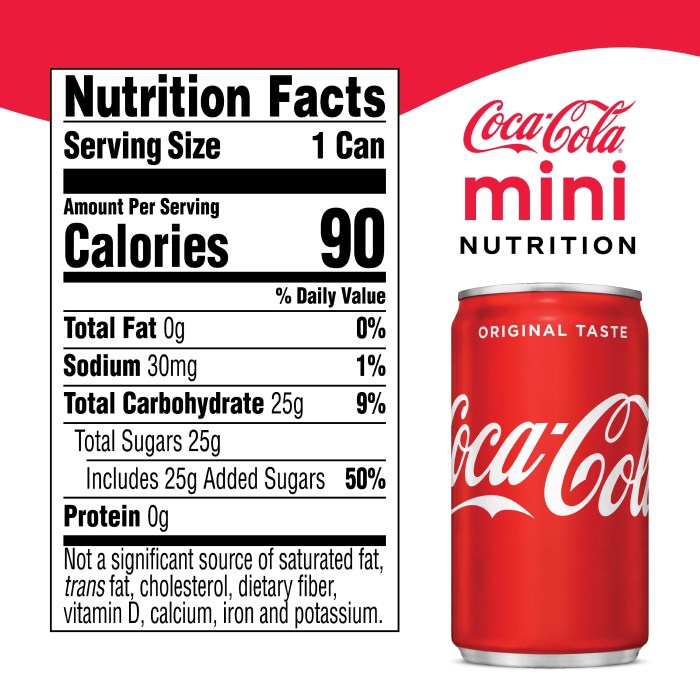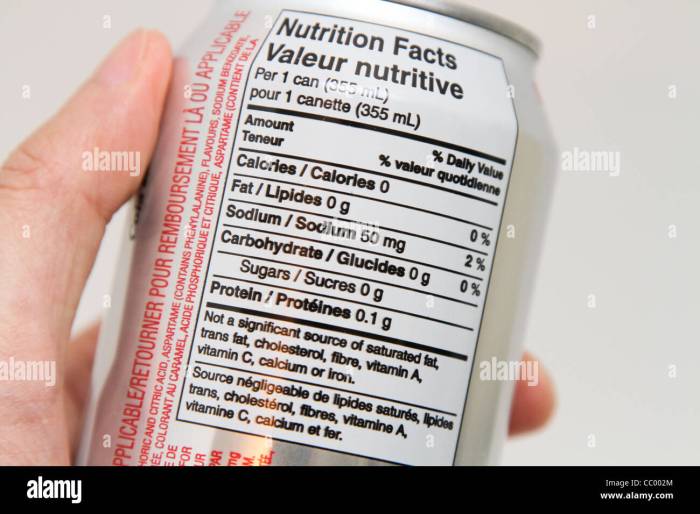Coca-Cola vs. Diet Coke: Coke And Diet Coke Nutrition Facts
Coke and diet coke nutrition facts – Choosing between Coca-Cola and Diet Coke often comes down to a simple question: calories. Both are undeniably popular, but their nutritional profiles differ significantly, primarily due to their sugar content. This difference directly impacts their caloric value, and understanding this is key to making an informed choice.
Caloric Content and Sugar Comparison
The core difference between Coca-Cola and Diet Coke lies in their caloric and sugar content. A standard serving size reveals a stark contrast. Below is a table outlining the key nutritional differences, based on typical serving sizes found in the United States. Note that slight variations might exist depending on the specific product and region.
| Serving Size | Calories | Sugar Content (grams) | Artificial Sweeteners |
|---|---|---|---|
| 12 fl oz (355 ml) | 140 | 39 | None |
| 12 fl oz (355 ml) | 0 | 0 | Aspartame, Acesulfame Potassium |
The impact of sugar on caloric intake is significant. Sugar provides approximately 4 calories per gram. Therefore, the 39 grams of sugar in a 12-ounce Coca-Cola contribute significantly to its 140-calorie count. Diet Coke, utilizing artificial sweeteners instead of sugar, avoids this caloric contribution entirely.
Visual Representation of Caloric Difference
Imagine two bars representing the caloric content of each beverage. The Coca-Cola bar would be substantially longer, roughly representing 140 units of length, while the Diet Coke bar would be significantly shorter, a mere zero units in length. This visual representation clearly illustrates the dramatic difference in caloric intake between the two drinks. The absence of a bar for Diet Coke visually emphasizes its zero-calorie nature.
Macronutrient Breakdown

Let’s delve into the specifics of what makes up Coca-Cola and Diet Coke, focusing on the macronutrients: carbohydrates, fats, and protein. Understanding these components is crucial for evaluating their nutritional profiles and how they might fit into a balanced diet. While neither drink is considered a health food, knowing the macronutrient differences helps clarify their impact.The macronutrient content varies significantly between the two beverages due to the presence of sugar in Coca-Cola and its absence in Diet Coke.
This difference has profound implications for how the body processes each drink.
Macronutrient Comparison: Coca-Cola vs. Diet Coke
The following table details the macronutrient breakdown per serving (typically 12 ounces) of Coca-Cola and Diet Coke. Note that these values can slightly vary depending on the manufacturer and serving size.
| Nutrient | Coca-Cola amount | Diet Coke amount | Units |
|---|---|---|---|
| Carbohydrates | 39 | 0 | grams |
| Sugars | 39 | 0 | grams |
| Fat | 0 | 0 | grams |
| Protein | 0 | 0 | grams |
The significant difference lies in the carbohydrate content, primarily from sugar in Coca-Cola. This sugar provides quick energy but contributes to calorie intake and can impact blood sugar levels. Diet Coke, lacking sugar and other macronutrients, offers virtually no calories or nutritional value from these components.
Role of Macronutrients
Let’s examine the role of each macronutrient in the context of these beverages.
- Carbohydrates: In Coca-Cola, carbohydrates are primarily in the form of sugar, providing readily available energy. However, excessive sugar intake is linked to weight gain, type 2 diabetes, and other health issues. Diet Coke’s zero carbohydrate content means it doesn’t contribute to these issues in the same way.
- Fats: Neither Coca-Cola nor Diet Coke contains any significant amount of fat. Fats are essential for various bodily functions, but these beverages are not a source.
- Protein: Both beverages are devoid of protein. Protein is crucial for building and repairing tissues, but these drinks do not contribute to protein intake.
Artificial Sweeteners in Diet Coke
Diet Coke, unlike its sugar-laden counterpart, relies on artificial sweeteners to achieve its characteristic sweetness without the calories. Understanding the types of sweeteners used and their potential effects on health is crucial for informed consumer choices. This section will delve into the specific sweeteners found in Diet Coke and explore both the short-term and long-term implications of their consumption.
The primary artificial sweetener in Diet Coke is aspartame. Aspartame is a dipeptide, meaning it’s composed of two amino acids: aspartic acid and phenylalanine. It’s approximately 200 times sweeter than sucrose (table sugar). Another artificial sweetener often included is acesulfame potassium, which is about 200 times sweeter than sugar and often used in combination with aspartame to enhance the overall sweetness profile and improve the taste.
Aspartame and Acesulfame Potassium: Short-Term Effects
Short-term effects associated with aspartame consumption are generally considered mild and infrequent. Some individuals report headaches, dizziness, or nausea, but these are not universally experienced and are often linked to individual sensitivities rather than a consistent, widespread effect. Similarly, short-term effects associated with acesulfame potassium are generally minimal. While some individuals might experience gastrointestinal discomfort, there is no widespread evidence of significant short-term health consequences for the majority of consumers.
Aspartame and Acesulfame Potassium: Long-Term Effects
The long-term effects of aspartame and acesulfame potassium consumption remain a subject of ongoing research and debate. While numerous studies have been conducted, the results are often inconclusive and sometimes contradictory. Some studies have suggested potential links between long-term consumption and an increased risk of certain health issues, such as increased risk of some cancers or metabolic syndrome. However, other studies have failed to find such correlations.
The complexities of human biology and the variety of lifestyle factors make it challenging to isolate the impact of these sweeteners alone. Regulatory bodies worldwide generally consider the amounts currently used in foods and beverages to be safe for consumption, but ongoing research continues to be essential.
Sweetness Intensity Comparison
Both aspartame and acesulfame potassium are significantly sweeter than sucrose (table sugar). Aspartame’s sweetness is generally considered to be around 180-200 times that of sucrose, while acesulfame potassium is approximately 200 times sweeter. This high intensity allows for the use of smaller quantities to achieve the desired sweetness in Diet Coke, contributing to its low-calorie profile. However, this intense sweetness can also lead to altered taste perceptions and potentially increased cravings for sweet foods and beverages over time, impacting dietary habits.
Sodium Content and its Implications
Both Coca-Cola and Diet Coke contain sodium, albeit in relatively small amounts. Understanding the sodium content and its potential health effects is crucial for informed beverage choices. While neither is a significant source of sodium compared to many other foods, it’s still important to consider its contribution to overall daily intake.Sodium is an essential electrolyte, playing a vital role in fluid balance and nerve function.
However, excessive sodium intake is linked to several health concerns.
Sodium Content in Coca-Cola and Diet Coke, Coke and diet coke nutrition facts
A standard 12-ounce serving of Coca-Cola typically contains approximately 15mg of sodium. Diet Coke, on the other hand, usually contains even less, typically around 5mg per 12-ounce serving. These values can vary slightly depending on the manufacturer and production processes. It’s important to always check the nutrition label on the specific product.
Health Implications of High Sodium Intake
High sodium intake is a major contributor to high blood pressure (hypertension), a significant risk factor for heart disease, stroke, and kidney disease. The body retains excess water when sodium levels are high, increasing blood volume and putting extra strain on the cardiovascular system. This increased pressure on blood vessel walls can damage them over time. The American Heart Association recommends limiting sodium intake to less than 2,300 milligrams per day, and ideally to no more than 1,500 milligrams per day for many adults, especially those with high blood pressure or other health conditions.
Sodium Levels Compared to Other Beverages
Compared to many other beverages, both Coca-Cola and Diet Coke are relatively low in sodium. Salty snacks, processed foods, and some broths can contain significantly higher amounts of sodium per serving. For instance, a single serving of some canned soups can easily exceed the sodium content of several cans of soda. Sports drinks, while designed to replenish electrolytes lost during exercise, often contain considerably more sodium than Coca-Cola or Diet Coke.
Therefore, while the sodium in these sodas is minimal, it’s part of a larger dietary picture that needs to be considered.
Understanding the nutritional content of Coca-Cola and Diet Coke involves comparing their sugar and calorie counts. A helpful comparison point when considering these differences is to examine the nutritional profile of other beverages, such as milk. For a detailed look at the nutritional benefits of milk, you might find the information at 2 milk nutrition facts insightful.
Returning to Coke and Diet Coke, remember that even without sugar, Diet Coke contains artificial sweeteners.
Caffeine Content and Effects

Both Coca-Cola and Diet Coke contain caffeine, a stimulant that affects the central nervous system. Understanding the caffeine content and its effects is crucial for informed consumption. While both offer a pick-me-up, the impact can vary based on individual sensitivity and consumption levels.
Caffeine Content per Serving
A standard 12-ounce serving of Coca-Cola typically contains approximately 34mg of caffeine, while a similar serving of Diet Coke usually contains around 46mg. This difference might seem small, but individual responses to caffeine vary widely. Factors like metabolism, body weight, and overall health influence how caffeine affects a person. It’s important to note that these figures can fluctuate slightly depending on the manufacturing process and specific product batch.
Effects of Caffeine on the Body
Caffeine’s primary effect is stimulation of the central nervous system. This leads to increased alertness, improved focus, and enhanced physical performance, at least in the short-term. However, excessive consumption can result in adverse effects such as anxiety, insomnia, restlessness, and an upset stomach. For some individuals, even moderate caffeine intake might trigger headaches, rapid heartbeat, or increased blood pressure.
The potential benefits, such as increased energy and improved cognitive function, should be weighed against the potential risks.
Caffeine Comparison: Coca-Cola vs. Diet Coke
The following text-based visual representation illustrates the caffeine comparison between the two drinks:“`Coca-Cola (12 oz): ███ (approx. 34mg)Diet Coke (12 oz): ████ (approx. 46mg)“`This simple bar chart visually demonstrates that Diet Coke generally contains a higher amount of caffeine per serving compared to Coca-Cola. Remember, this is a general comparison and variations can occur. Always check the specific nutrition label on the product for the most accurate caffeine content information.
Common Queries
Are there any vitamins or minerals in Coke or Diet Coke?
No, neither Coca-Cola nor Diet Coke contains significant amounts of vitamins or minerals. They are essentially empty calories.
What are the long-term health risks associated with drinking Diet Coke regularly?
While the long-term effects of artificial sweeteners are still being studied, some research suggests potential links to metabolic issues and other health concerns. Moderation is key.
How does caffeine in Coke and Diet Coke compare to coffee?
The caffeine content varies slightly between Coke and Diet Coke, but generally, a can of either contains less caffeine than a typical cup of coffee.
Is it okay to drink Diet Coke if I have diabetes?
While Diet Coke is sugar-free, it’s still important to consult your doctor or a registered dietitian about its suitability within your diabetes management plan. Artificial sweeteners can still affect blood sugar levels in some individuals.